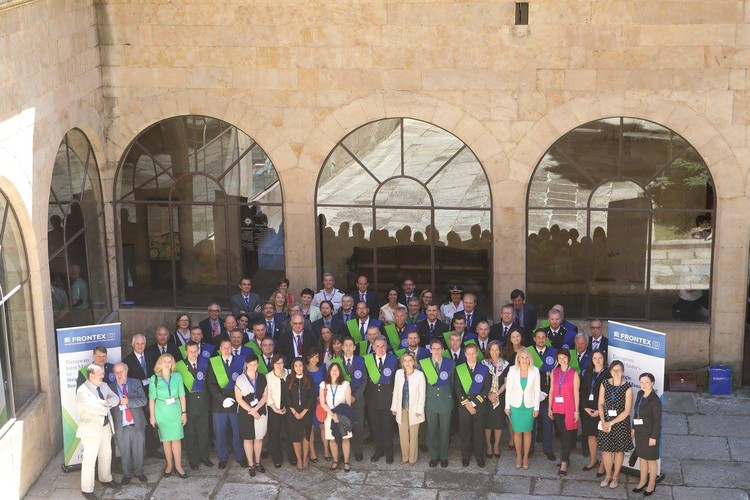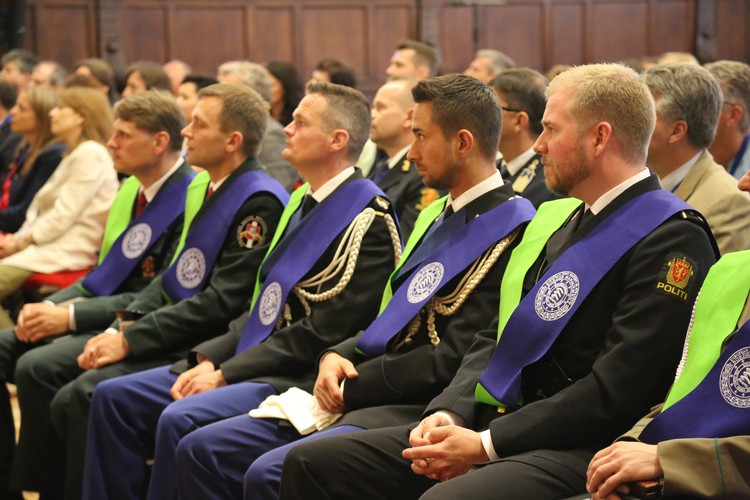In early June, the first group of graduates received a European joint master’s degree in Strategic Border Management, co-awarded by five higher education institutions: the Rezekne Academy of Technologies from Latvia, Mykolas Romeris University from Lithuania, the Netherlands Defence Academy Faculty of Military Science, the National University for Distance-Learning Education from Spain and the University of Salamanca, in collaboration with the Estonian Academy of Security Sciences.
News
Better knowledge is better management
2017-06-26

Over 18 months, 23 students from different European Member States learned about risk and threat management, innovation and technology related to border management, fundamental rights and EU borders policies and strategies.
“This Master’s programme changed my perspective from a national to a European one,” said Ilja Juho Aleksi Iljina, one of the first graduates of the programme, a senior Finnish border guard, while others admitted that it provided them with a solid academic and practical background for their work in border and coast guard authorities.
Another of the graduates, Luis Paulo Ribeiro de Gouveia, who is the Senior Coordinator at the Portuguese Immigration and Borders Service added: “It really gives you the tools for how to think strategically, how to act strategically, to design, plan and implement your strategy,” said.
To complete the programme, each of the participants had to write a dissertation, whose topics ranged from an analysis of the concept of European Integrated Border Management, the influence of sharing criminal intelligence and risk analysis on the effectiveness of border control, to ways to keep border guards mentally healthy while working in stressful environments.
Other graduates decided to write about coast guard cooperation between Frontex, the European Fisheries Control Agency (EFCA) and European Maritime Safety Agency (EMSA); privacy and security concerns in modern border control systems or the importance of international cooperation for an efficient strategic border management.
Frontex is currently looking into ways to integrate some of the research findings from the students’ theses in the agency’s activities while some of the Member States border guard organisations already use these results in implementation of their national strategies and action plans.
The dissertations were assessed by a group of experts from partner border security organizations, academics from academic partners and external examiners, chaired by professors from, among others, the Royal Military Academy of Belgium, Vytautas Magnus University of Lithuania, Fern University of Germany, Erasmus University of Rotterdam and Leiden University of the Netherlands.
Why does Europe need a joint master’s degree in European Strategic Border Management?

The recent migratory pressure at EU borders which coincides with threats posed by trans-border crime and terrorism have confirmed the need to develop a European border guard community with leaders with a strategic vision of border management.
“The European Union has huge challenges at their external borders. We need to reinforce our capacities and we need strategic leaders. We need European leadership,” said Frontex Director Fabrice Leggeri in a message addressed to the first group of graduates of the European Joint Master’s in Strategic Border Management programme.
Border control is not only about document checks and detecting illegal entries. It also helps combat cross-border crime, such as trafficking in human beings or smuggling of drugs, illegal arms and other goods. Therefore, the effective management of the common EU external borders and of the migratory flows is crucial for keeping and maintaining the Schengen free movement area.
When creating this programme, Frontex identified a demand for strategic leadership that will support development of integrated border management and a common EU border and coast guard culture.
The Master’s programme bridges the gap between operational needs and the academic world, providing both the necessary background and legal framework, as well as the practical skills needed for field work.
This unique programme was created to harmonise education of border guards at a European level, and equip European border and coast guard officers with expertise that will allow them to tackle challenges such as terrorism, cross-border crime or increased migratory pressure at the EU’s external border.
“Ultimately, border control comes down to people, to border guards. This is why it is essential to equip them with the right skills and competences,” said Dr. Julie Norris, a forensic psychologist with expertise in law enforcement training design and one of the lecturers of the Master’s Programme.
The role of Frontex
The programme was developed by Frontex, the European Border and Coast Guard Agency, together with academics and experts from 20 European Member States.
When Frontex began to deploy officers in its operations it became clear that border guards in some countries tend to be specialised in a different area than border guards in other countries; that the equipment at the disposal of Member States largely varies; and that the officers have different levels of training. For example officers from countries without an external border will often not have experience with a land border operation.
Border authorities working on the Eastern land border are experts at detecting stolen vehicles, while border authorities in Spain have extensive experience in the detection of narcotics smuggled across the Mediterranean.
One of the key tasks of Frontex was to, develop training curricula for border guards across the EU to help harmonise border control in all Member States, and to ensure that the attitude and values of the border guards are facilitating the implementation the European policies and strategies through their daily work.
The project started to take shape in 2012, with Frontex developing common standards for border guard education and competence profiles at all levels through the Sectoral Qualifications Framework for Border Guarding, paving the way for the harmonisation. In the next years, the agency went further and started collaborating with universities, establishing the Master’s programme as a framework for border guard studies, leading to the recognition of the border guard profession in the academic world according to the European higher education standards.
Bringing together experts from different fields, such as specialists in coast guard activities, land border operations, risk analysis, fundamental rights, and European law, the Master’s provides a comprehensive background for the work in border management for senior level professionals.
The curriculum was developed by an over 80 academic and border guard experts from Austria, Belgium, Bulgaria, Denmark, Estonia, Finland, Greece, Germany, Hungary, Ireland, Latvia, Lithuania, Malta, Netherlands, Romania, Spain, Slovakia, Slovenia, Switzerland, and the UK.
Also a number of EU agencies and international organisations participated in the shaping of the content of the studies, among them the European Asylum Support Office, UNHCR, OSCE, INTERPOL, the Democratic Control of Armed Forces (DCAF) and the Fundamental Rights Agency.
“It was a long and challenging process to develop such a unique joint degree leading to an internationally recognised joint award, one of its kind in Europe,” said Anemona Peres, the master’s project manager. “We knew the first cohort of students will be the true test of our work, and they made all our efforts pay off. They truly demonstrated the values of this programme: cooperation, teamwork, learning from each other, leadership, openness and trust.”
The development of a Joint Master’s at European level is a great opportunity for all Member States to provide the possibility for professional development for their senior staff as individual countries could not afford to establish such a Master’s Programme at national level due to the limited number of high-level officers working in a border management at strategic level.
The students are nominated by the national border guard authorities in the individual Member States and Schengen Associated Countries.
A new admission process was launched in March this year. The requirements for candidates are a bachelor’s degree, a minimum of 3 years in an operational border guard function at middle management level, as well as proficiency in English.
For more information about the Joint Master’s in Strategic Border Management, see our video: